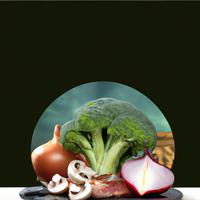
1 serving (100 grams) contains 35 calories, 2.5 grams of protein, 0.3 grams of fat, and 6.5 grams of carbohydrates.

Log this food in SnapCalorie

Nutrition Information
Calories |
70 | ||
|---|---|---|---|
% Daily Value* |
|||
| Total Fat | 0.6 g | 0% | |
| Saturated Fat | 0.1 g | 0% | |
| Polyunsaturated Fat | 0 g | ||
| Cholesterol | 0 mg | 0% | |
| Sodium | 50 mg | 2% | |
| Total Carbohydrates | 13 g | 4% | |
| Dietary Fiber | 5 g | 17% | |
| Sugars | 5 g | ||
| protein | 5 g | 10% | |
| Vitamin D | 0 mcg | 0% | |
| Calcium | 80 mg | 6% | |
| Iron | 1.6 mg | 8% | |
| Potassium | 600 mg | 12% | |
* Percent Daily Values are based on a 2,000 calorie diet. Your daily values may be higher or lower depending on your calorie needs.
Food Attributes
Source of Calories
About Broccoli mushroom and onion
Broccoli, mushrooms, and onions are a popular vegetable trio celebrated for their versatility and nutritional benefits. Broccoli, a cruciferous vegetable, is packed with vitamins C and K, fiber, and antioxidants, supporting immune health and digestion. Mushrooms are a low-calorie fungi rich in B vitamins, selenium, and ergothioneine, which may support cellular health and boost immunity. Onions, a staple in many cuisines, contain vitamin C, antioxidants, and sulfur compounds that promote heart health and reduce inflammation. This combination is commonly featured in stir-fries, soups, and sautés, particularly in Asian and Western cuisines. Low in calories and free from unhealthy fats, they make a healthful addition to meals, though sodium levels can increase depending on preparation methods, such as adding sauces or seasonings. Together, these vegetables provide a nutrient-dense option for plant-based eating, enhancing both flavor and health.



